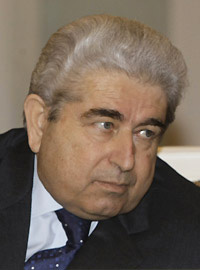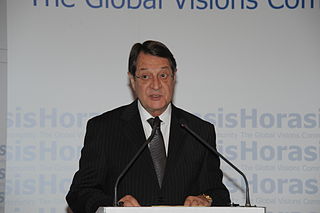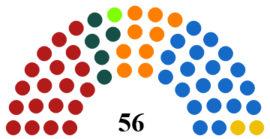
The Progressive Party of Working People is a Marxist–Leninist, communist political party in Cyprus.

Efstathios "Tassos" Nikolaou Papadopoulos was a Cypriot politician and barrister who served as the fifth President of Cyprus from February 28, 2003 to February 28, 2008.

The Movement for Social Democracy is a Greek Cypriot nationalist, social-democratic political party in Cyprus.

The Democratic Party is a Greek-Cypriot nationalist, centrist political party in Cyprus founded in 1976 by Spyros Kyprianou.
The Republican Turkish Party is a social-democratic political party in Northern Cyprus. The party was founded in 1970 by Ahmet Mithat Berberoğlu, a lawyer, in opposition to the leadership of Fazıl Küçük and Rauf Denktaş.

Elections in Cyprus gives information on election and election results in Cyprus.

Demetris Christofias, also spelled Dimitris Christofias, is a Cypriot former politician who was the sixth President of Cyprus from 2008 to 2013. Christofias was the General Secretary of AKEL, the Communist Party of Cyprus, and was the European Union's and Cyprus' first, and so far only, Communist head of state. He won the 2008 Cypriot presidential elections in the second round of voting. Throughout the election campaign, he pledged to restart talks with Turkish Cypriots in order to find a solution to the Cyprus dispute and reunify the island. He has also supported the closure of the British military bases on Cyprus.

The European Party was a political party in Cyprus founded in 2005, largely out of the parties New Horizons and European Democracy. In March 2016, it dissolved to merge into the Solidarity Movement.

The Cypriot presidential election of 2008 was held on 17 February 2008, with the runoff held on 24 February 2008. The second-round winner, and thus the President of Cyprus for the next term, was Dimitris Christofias.

Presidential elections were held in Cyprus on 17 February 2013. A runoff was held on 24 February 2013. Nicos Anastasiades of Democratic Rally won the election. The other candidates were Stavros Malas of the Progressive Party of Working People (AKEL); Praxoula Antoniadou of the United Democrats; Lakis Ioannou with the support of LASOK; Loukas Stavrou; ELAM's Giorgos Charalambous, Giorgos Lillikas of Movement for Social Democracy (EDEK); and independents Andreas Efstratiou, Makaria-Andri Stylianou, Kostas Kyriacou(Outopos) and Solon Gregoriou. Although the president Demetris Christofias was not term-limited, he did not seek re-election in 2013.
A joint declaration was made on 11 February 2014 at the start of renewed negotiations to settle the Cyprus dispute. The following talks between Nicos Anastasiades, President of Cyprus, and Derviş Eroğlu, President of Northern Cyprus, were stalled in October 2014.
Cyprus's component of the 2014 European Parliament election was held on Sunday, 25 May 2014.

Parliamentary elections were held in Cyprus on 22 May 2016 to elect 56 of the 80 Members of the House of Representatives.

The First Anastasiades government was the government of Cyprus, forming the Council of Ministers, in 2013–2018. Sworn in on 28 February 2013, it initially consisted of 13 ministers representing a governing coalition of President Nicos Anastasiades' Democratic Rally party (DISY) with DIKO and EVROKO parties. After the withdrawal of DIKO from the coalition in 2014, the government coalition consists only of DISY and EVROKO members, as well as other, independent technocrats. Following Anastasiades' victory in the 2018 election, the Second Anastasiades government was formed, with a very similar composition.
The 2008-12 Cyprus talks were held as part of the long-going peace process, in order to resolve the Cyprus dispute. The talks failed to achieve their goals. At the beginning of 2013, Cyprus negotiations were suspended because of a change of government in the Greek Cypriot community of Cyprus.
Greek-Cypriot nationalism is an ethnic nationalism emphasising Greekness of the Cypriot nation, whilst contrasting with Greek nationalism which aspires to integrate Cyprus into Greece as its main and number one objective. Having abandoned the idea of enosis, Greek Cypriot nationalists now have the aim of a Greek Cypriot-controlled state with close relations to Greece, the "motherland". Variants of the nationalism have been espoused by the centre-right Democratic Party (DIKO), the right-wing New Horizons, Socialists (EDEK), the Greek Orthodox Church of Cyprus, and nationalist elements within the centre-right Democratic Rally (DISY).

Presidential elections were held in Cyprus on 28 January 2018. As no candidate received a majority of the vote in the first round, a run-off was held on 4 February between the top two candidates, incumbent President Nicos Anastasiades of the Democratic Rally (DISY) and Stavros Malas of the Progressive Party of Working People. Anastasiades emerged as the winner with 55.99% of the vote.



























